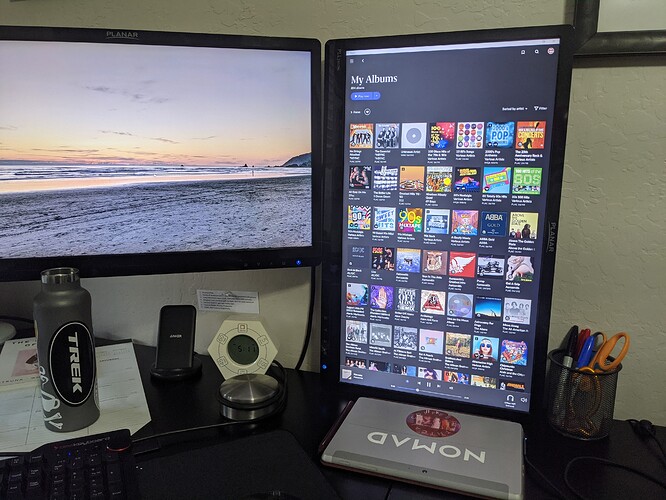Over the last ~6 months I’ve experimented with using Tidal / Qobuz native apps, Audirvana, and Roon. The Tidal and Qobuz apps are great for the price (free w/ service), but they are missing some features that I value. Audirvana was too “clunky” for me, user interface wasn’t very attractive to my eye and the music discovery was basically non-existent.
Roon has been a love/hate relationship. The features cover all my use cases, but it’s also fairly complex and it’s taken me a while to get it running well for my setup (sounding good and reliable). I used it last year and ended up walking away for two reasons: cost and streaming to chromecast targets didn’t sound as good to me. But when 1.8 came out i gave it another try. The cost model has improved, I prefer a smaller monthly fee than a large yearly (or life time) fee. And I finally got the streaming to Chromecast targets sorted out (issues with glitches, low quality sound, etc). I like the new 1.8 interface, and the music discovery on Tidal & Roon is better (in my use cases). So now Roon is my daily driver.
My setup:
Roon Core: Mac Mini w/ Core i5 and 32GB ram (doubles as family homeschool computer, so extra memory comes in handy)
Roon Remotes: Windows Laptop, Surface Go, and Android phone(s)
Streaming Targets: 4 Chromecast Audios (CCA) using optical output at 24/96 - work desk, listening chair, office speakers, garage speakers. The CCA at my listening chair is paired with an iFi SPDIF iPurifier2 to add some extra awesomeness.
My next audio system upgrade is going to be “better” streaming targets (raspbery pi, or bluesound node 2i, or something like that). Now that I’ve got Roon utilizing the CCA’s correctly I think the sound is really good. But can’t say for sure till I “upgrade” to a better streamer and compare.
I avoid USB as much as possible. Just too many ways it can go wrong. And since all my computers (apart from the Roon Core) are mobile devices, I don’t really want to have to plug in to listen to music. Using all network streamers is just clean.
I’m currently in full crazy mode with my streaming subscriptions: running both Tidal and Qobuz on Roon - so 3 monthly subscriptions (when wife figures this out I’ll have to pick one, but let’s see how long I can hold out).
After about 3 months of using Roon daily I really can’t imagine going back. The ease of use and music discovery are just fantastic.


